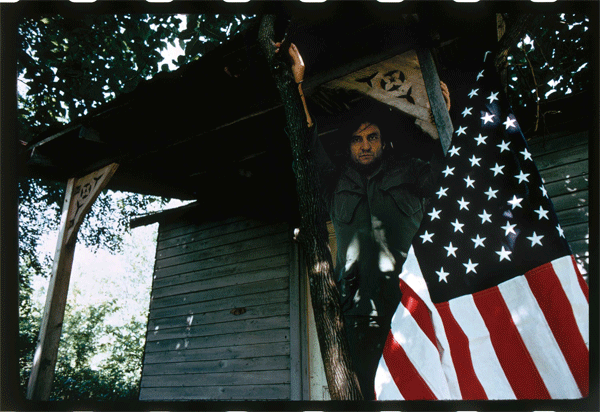
By Matthew Ralph
“Mostly he was obviously against the system.”
Those are the words former San Quentin prisoner turned music legend Merle Haggard uses to sum up Johnny Cash in a new documentary that traces the Man In Black’s distinct influence on American culture, music, politics and religion during a remarkable music career and life.
“He represented so many different things for so many different people,” Haggard also says in the film.
To Haggard and many of his fellow prisoners Cash entertained at one of his high-security concerts in the ’60s, he was an outlaw spirit who represented the hope of a new life. To politicians both Republican and Democrat he was a patriot who dressed in black but bled red, white and blue. To the evangelist Billy Graham, he was someone who could testify to the multitudes at his rallies of a life struggling with sin, addiction and various other demons. To music fans, he was and continues to be an artist difficult to pigeonhole.
In a time of division and polarization, Johnny Cash’s America reminds us of the spirit, the beauty and the contradictions of what it means to be an American by telling the story of a man who embodied and celebrated all of the things that make this country what it is.
John Carter Cash perhaps puts it best in the film when he discusses the universal appeal of his father’s music.
“If you go into a punk rock fan, their house in Frankfurt, Germany, and you look up on their shelves you’ll see the Sex Pistols you know, you’ll see the Misfits and you’ll see Johnny Cash,” he says. “If you go to a little old lady’s house in Schenectady who loves country music and gospel songs, you look up on her record shelves and there’s just as
many Johnny Cash records.”
Tracing Cash’s life from his early days in Dyess, Ark., to his final music video of a Nine Inch Nails song seven decades later, the 90-minute film incorporates the words of Cash both spoken and sung with the testimonies of everyone from Snoop Dogg, Vince Gill and Al Gore to Ozzy Osborne, Tim Robbins and Tennessee Sen. Lamar Alexander. Cash’s sister Joanne, daughters Cindy and Rosanne, son John Carter and a host of childhood friends, bandmates, producers and other admirers also offer their insight into the multi-faceted biography of a complex man.
Through the songs (27 in all in the film, 19 of which are compiled in an accompanying soundtrack), interviews and the footage of Cash with presidents, speaking at Billy Graham crusades, hosting his television show and working in the studio with fellow legends Bob Dylan and Willie Nelson, a touching story begins to emerge, with warts and all, of a sinner and a saint who wore black, as he explained in the song “Man in Black,” to represent the poor and the downtrodden, the prisoner and the soldier.
“I mean, it says a lot about who he is that he’s thinking about the poor and the beaten down living on the hopeless hungry side of town,” his daughter Cindy Cash says, talking about “Man in Black” in the film. “He’s thinking about the prisoner whose long paid for his due. He’s thinking about the soldier who was just killed. All these people are mentioned in that one song. And that was his life. Connecting with all those people.”
By the time the film reaches its tear-jerking “Hurt” video finale, it’s hard not to be reminded of the collective sadness of music fans everywhere in 2003 when news of his death spread. It was also hard for me personally to not still be a little perplexed that my local newspaper gave as much space on the front page to news of John Ritter’s death. John Ritter?
Johnny Cash, after all, was oh so much more than a celebrity, a musician or an entertainer. He was an advocate for voiceless Native Americans, a friend to prisoners, an outlaw who only ever served four hours of a jail time, a drug addict who was honest about his struggles, a man of principal who refused to appease President Nixon’s request for a song about a man cheating the welfare system in a White House visit, and a patriotic and sentimental man who could somehow still look cool wearing a black shirt with gawdy red, white and blue eagles stitched on both shoulders.
After the film closes with footage of Cash riding a locomotive, it started, for me at least, to not seem like too much of a stretch or a complete act of hero worship to say that Johnny Cash indeed was and still is America. The words of Al Gore talking about Cash transcending the arbitrary ideological and partisan lines we like to draw still ringing in my ear, the film ultimately left me with the impression that a little bit of Johnny Cash might just be what America needs most right now.
Johnny Cash’s America, the DVD/CD set, comes out Tuesday, Oct. 28, on Legacy Recordings.
Leave a Reply